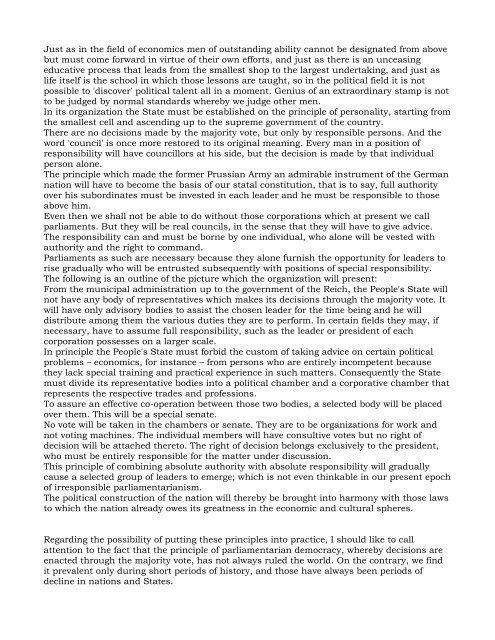Mein Kampf by Adolf Hitler
Mein Kampf by Adolf Hitler
Mein Kampf by Adolf Hitler
- TAGS
- kampf
- adolf
- hitler
- stuff2share.com
You also want an ePaper? Increase the reach of your titles
YUMPU automatically turns print PDFs into web optimized ePapers that Google loves.
Just as in the field of economics men of outstanding ability cannot be designated from above<br />
but must come forward in virtue of their own efforts, and just as there is an unceasing<br />
educative process that leads from the smallest shop to the largest undertaking, and just as<br />
life itself is the school in which those lessons are taught, so in the political field it is not<br />
possible to 'discover' political talent all in a moment. Genius of an extraordinary stamp is not<br />
to be judged <strong>by</strong> normal standards where<strong>by</strong> we judge other men.<br />
In its organization the State must be established on the principle of personality, starting from<br />
the smallest cell and ascending up to the supreme government of the country.<br />
There are no decisions made <strong>by</strong> the majority vote, but only <strong>by</strong> responsible persons. And the<br />
word 'council' is once more restored to its original meaning. Every man in a position of<br />
responsibility will have councillors at his side, but the decision is made <strong>by</strong> that individual<br />
person alone.<br />
The principle which made the former Prussian Army an admirable instrument of the German<br />
nation will have to become the basis of our statal constitution, that is to say, full authority<br />
over his subordinates must be invested in each leader and he must be responsible to those<br />
above him.<br />
Even then we shall not be able to do without those corporations which at present we call<br />
parliaments. But they will be real councils, in the sense that they will have to give advice.<br />
The responsibility can and must be borne <strong>by</strong> one individual, who alone will be vested with<br />
authority and the right to command.<br />
Parliaments as such are necessary because they alone furnish the opportunity for leaders to<br />
rise gradually who will be entrusted subsequently with positions of special responsibility.<br />
The following is an outline of the picture which the organization will present:<br />
From the municipal administration up to the government of the Reich, the People's State will<br />
not have any body of representatives which makes its decisions through the majority vote. It<br />
will have only advisory bodies to assist the chosen leader for the time being and he will<br />
distribute among them the various duties they are to perform. In certain fields they may, if<br />
necessary, have to assume full responsibility, such as the leader or president of each<br />
corporation possesses on a larger scale.<br />
In principle the People's State must forbid the custom of taking advice on certain political<br />
problems – economics, for instance – from persons who are entirely incompetent because<br />
they lack special training and practical experience in such matters. Consequently the State<br />
must divide its representative bodies into a political chamber and a corporative chamber that<br />
represents the respective trades and professions.<br />
To assure an effective co-operation between those two bodies, a selected body will be placed<br />
over them. This will be a special senate.<br />
No vote will be taken in the chambers or senate. They are to be organizations for work and<br />
not voting machines. The individual members will have consultive votes but no right of<br />
decision will be attached thereto. The right of decision belongs exclusively to the president,<br />
who must be entirely responsible for the matter under discussion.<br />
This principle of combining absolute authority with absolute responsibility will gradually<br />
cause a selected group of leaders to emerge; which is not even thinkable in our present epoch<br />
of irresponsible parliamentarianism.<br />
The political construction of the nation will there<strong>by</strong> be brought into harmony with those laws<br />
to which the nation already owes its greatness in the economic and cultural spheres.<br />
Regarding the possibility of putting these principles into practice, I should like to call<br />
attention to the fact that the principle of parliamentarian democracy, where<strong>by</strong> decisions are<br />
enacted through the majority vote, has not always ruled the world. On the contrary, we find<br />
it prevalent only during short periods of history, and those have always been periods of<br />
decline in nations and States.


